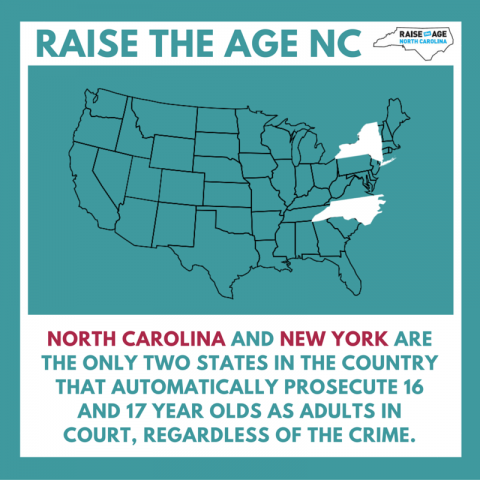
Recently, I attended a public hearing presided by the NC Commission on the Administration of Law & Justice (NCCALJ). One of the top issues on their agenda was Juvenile Reinvestment. NC is one of only two states (NY being the other) that automatically charges 16- and 17-year olds as adults regardless of the offense. This concept of prosecuting kids as adults confounds me.
NC does not legally allow teens to drink, vote, or obtain a regular driver’s license, among other things. Therefore, it baffles me that teens 16- and 17-years of age are considered competent enough to navigate the legal system and understand the full consequences of their actions.
A cost analysis report by the Vera Institute of Justice confirmed teens lack the competence “to stand trial under the same circumstances as adults." Furthermore, the report substantiated the notion of a teenagers ability to make reasonable judgments. At this age, their cognitive processing skills are not as efficient.
When discussing this issue with North Carolina Criminal Defense Attorney, Craig James, he put it this way:
A youth is considered a minor until 18 (the NC age of majority) and therefore cannot participate in certain activities such as entering into a contract, commencing legal actions, obtaining full driving privileges, marry, nor enlist in the armed forces without parental consent. However, NC wants to treat 16- and 17-year olds as adults in criminal court. On the one hand, NC takes great strides to protect minors. For instance, if a 15 year old girl has intercourse with a 19 year old, a crime has been committed. The law specifically states the 15 year old cannot give consent and her willingness to participate is not a defense. Therefore, if a youth cannot consent to certain acts at 15, how do they possess the mental capacity to understand the full ramifications of their actions at 16 and be expected to understand the legal system as well. So what does our legislature believe happens in the 12 months between 15 and 16?
Additionally, kids placed in adult prisons are more likely to be sexually assaulted and to commit suicide. They also have a higher recidivism rate than if they had been prosecuted within the juvenile justice system. In comparison, if teens in this age group are handled within the juvenile justice system, they would be provided with valuable resources and parental support not afforded to them in the adult system.
Also, prosecuting these minors as adults negatively impacts the rest of their lives. They are marked with adult records, for an adolescent offense, and it follows them everywhere. It could prevent them from securing housing, employment, or serving in the military. If charged as juveniles, their criminal records would remain sealed.
As a mother of a 17 year old male, I’m often reminded of how kids this age do not fully grasp the long term consequences of their actions. Some of the things my son and his peers deem harmless or as just a funny prank reveals their level of maturity.
Even as I recall some of the careless decisions I made at 16 and 17, I can now acknowledge I did not fully grasp the ramifications of my actions.
According to the same Vera Institute of Justice report, studies concluded youth under 18 years of age are “less culpable because they do not fully comprehend the consequences of their actions.”
Now this is not to say teens should not be held accountable for their mistakes. They should. However, the courts should have systems in place to determine if the type of crime a 16- or 17-year old is charged with warrants automatically prosecuting him/her as an adult.
We know kids can make foolish mistakes. Honestly, adults can too. Hopefully, we all learn from those mistakes. And most definitely, we all want to be given another chance. The idea of raising the age for these youths helps give them that additional chance.
In North Carolina, the attempt to raise the age for juvenile offenders tried as adults has been ongoing for over 10 years. Thankfully, recent discussions on this issue now show support from some court and police officials. Hopefully, the public forum lead by the NCCALJ and the ongoing advocacy from groups like MomsRIsing, NC Child, and ACLU of NC, will help North Carolina get on board with the vast majority of the other states and give our youth better options.



The views and opinions expressed in this post are those of the author(s) and do not necessarily reflect those of MomsRising.org.
MomsRising.org strongly encourages our readers to post comments in response to blog posts. We value diversity of opinions and perspectives. Our goals for this space are to be educational, thought-provoking, and respectful. So we actively moderate comments and we reserve the right to edit or remove comments that undermine these goals. Thanks!